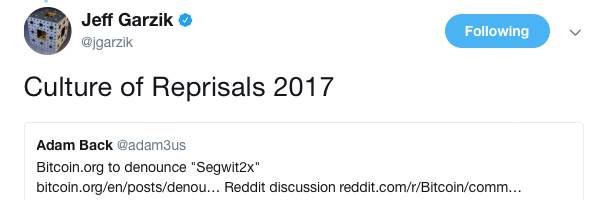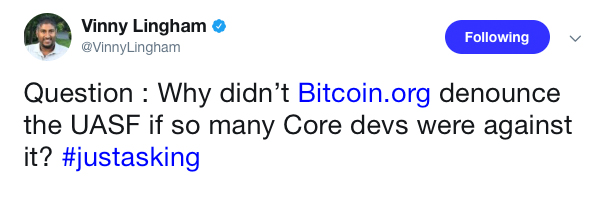There's an old saying, "Don't let the fox watch the henhouse." This may well be true when it comes to crypto-industry insiders and their opinions about the price of Bitcoin. But whether anti-Bitcoin fanatics like it or not, the price is steadily climbing toward the $6,000 mark.
Bitcoin liquidity, adoption
With the price of Bitcoin climbing toward the elusive $6,000, the reasons behind this rise are a point of contention. With the industry in an uproar, some market leaders link the rise in price to the increase in Bitcoin liquidity. For example, Luis Cuende, cofounder of Aragon said:
"I think the rise in Bitcoin prices reflects the enthusiasm that the public has into Bitcoin being a digital currency and new technical solutions like SegWit, that enable more scalability and new solutions for instant payments."
Not everyone thinks that Bitcoin is a good choice for currency, especially since prices fluctuate so rapidly and massively. Nevertheless, in countries like Argentina, where the fiat currency is effectively valueless, Bitcoin may well be the only option. According to David Henderson, Founder of Sweetbridge:
"A quick look at Bitcoin's price history (the two pizzas famously ordered by a developer for 10,000 BTC in 2010 would be worth about $30 million each today!) shows the challenges in using this as a transactional currency or as collateral, as the fluctuations are significant and frequent, unlike most fiat currencies. That said, it can provide an alternative in countries where the local currency is heavily controlled, restricted and subject to very high inflation."
Bitcoin vs. gold, other assets
Additionally, beyond the liquidity issue, Bitcoin is also carrying its weight as an asset in itself, and has even been suggested as a reserve currency. According to Yonatan Sela, SVP Business Development, YouNow:
"The soar in the price of Bitcoin isn't surprising, and I expect that while price fluctuations will continue, in the long term Bitcoin will continue to rise in price far beyond $6,000, especially if you buy into the thesis that Bitcoin could become the prominent digital reserve currency. The main reserve currency in the world is gold, with a market cap of ~$7 trillion USD. Bitcoin is currently at ~$94 billion which is less than 1.5% of that. Even if it stays just 2% of gold, it will surpass the $6,000 price point."
Other leaders were quick to point out that the asset characteristics of Bitcoin are only just now becoming mainstream. As more and more people discover Bitcoin, the price will only trend higher.
In fact, the fear, uncertainty and doubt (FUD) caused by comments from Jamie Dimon, Larry Fink and others simply adds to public awareness, which in turn drives up prices. Per Serafin Lion Engel, CEO and Founder of DataWallet:
"Bitcoin proves to be an antifragile asset which, due to its characteristics of immutability, transparency, and disintermediation, thrives in a world of ever-increasing political and socio-economic uncertainty. Comments, such as Jamie Dimon's, drive the Bitcoin hormesis we are currently witnessing, where adversarial comments by renowned beneficiaries of the current centralized system simply add to the strength of the Bitcoin ecosystem. Furthermore, it also simply boils down to exposure: The more people hear that about Bitcoin, the more people will adopt Bitcoin since its benefits over the past financial system are so abundantly clear."
However, most industry experts see that the power of Bitcoin is not only in its technology, but in its longevity. As the oldest and most stable cryptocurrency, it has the trust of the digital currency community. Eyal Herzog and Galia Benartzi Co Founders of Bancor said:
"What's interesting here to remember is that Bitcoin has at least 4 years of momentum accumulation before Ethereum. This is a great reminder that real value networks don't just spike into existence. They take time and dedication to build and take real root. We should keep this in mind as we look at new alt coins and somehow expect them to skyrocket in days or weeks."
Bitcoin instability and volatility
In spite of the huge run up in price over the last few days, the value of the cryptocurrency may well see substantial volatility. Even if Bitcoin does hit $6,000 (which appears quite likely), the price may see another massive drop, just as it did when the $5,000 price point was first touched. Further, any negative news may cause some unrest in the price. According to Bharath Rao, CEO of Leverj:
"The Bitcoin price has moved from under $1,000 at the beginning of the year to around $6,000. The price should certainly be expected to fluctuate quite a bit, both due to the uncertainty and promise of new technology. We believe that Bitcoin is not yet mainstream and will continue to grow in value as more financial use cases move to crypto. Buying and holding Bitcoin has outpaced every single traditional investment since 2009 and is likely to continue to do so for several years."
Bitcoin long term?
Among experts, most see the strength of Bitcoin being assured, at least in the short term. While anti-Bitcoin pundits may critique the platform, the reality that Bitcoin has achieved some consensus for mainstream acceptance is clear. According to Rob Viglione, Co-Founder of ZenCash:
"It's always tough to say what's driving prices, but what we do know is that there's more demand for Bitcoin now than ever. A big part of that is due to the fact that it has steadily achieved more mainstream credibility and that there's now a robust global conversation. For those of us who study cryptocurrency characteristics, there's growing consensus that we're witnessing the birth of a new asset class, and that's huge."
However, many see fundamental flaws within the structure of Bitcoin technology - particularly with block creation. The continued production of blocks depends on substantial electrical use and huge output of resources. Some say that Bitcoin, with its Proof of Work (PoW) protocol, may well be overtaken by other altcoins with the Proof of Stake (PoS) protocol. Technical experts see a need for change, like Lior Yaffe Core Developer at NXT ARDOR:
"The recent increase in Bitcoin's value is likely due to it being the de-facto exchange currency between the fiat and crypto worlds, much the same as the US dollar is between fiat currencies. It is quite obvious that Bitcoin is not going to replace any fiat currency any time soon due to scaling issues and the waste generated by the POW process. Going forward I predict that most innovation in the crypto world in the mid to long term will take place on POS based blockchains, but being the bridge between the worlds gives Bitcoin a huge short term boost."
The move toward $6,000 is not only encouraging because of the price point for Bitcoin holders. To some industry experts, the price shift is really reflective of the power of Bitcoin and Blockchain technology to truly change the world. According to Carl Bennetts Co-Founder of Status.im:
"Reaching milestones against fiat currency certainly aren't inconsequential, but what's far more interesting to me is the long term trend at play, and what this signifies for the future of blockchain technologies. While 6,000 USD certainly reflects some market maturity, what's truly exciting is that we're slowly edging towards mass-adoption, a world of true financial self-sovereignty, and an open financial system that brings fair access the anyone with an internet connection."
Generally, the consensus among industry leaders is that the Bitcoin bull will continue to run, and $6,000 will be achieved.


















